Photographs: Reuters
The hike in petrol price was necessitated because of increase in prices of crude oil in the international market, Union Finance Minister Pranab Mukherjee said.
"The price of crude oil in the international market has touched $90 a barrel. Petrol prices have been deregulated already. So the hike in price was in parity with international prices," Mukherjee said.
While consumers are undoubtedly unhappy and the country's opposition political parties have begun to exploit this unhappiness, the Union government had no option but to hike petrol prices.
Analysts say that there is no convincing case for subsidising petrol, even if there can still be some case for subsidising diesel and kerosene.
These are all old arguments that have been gone through for over a decade now. It was the so-called 'R group', headed by economist Vijay Kelkar, a former petroleum secretary, that first laid out the road map for deregulation of petrol and petroleum product prices over a decade ago, said a Business Standard report some days ago.
The argument is based on the simple principle that an import-dependent nation like India cannot afford to encourage excessive consumption of energy based on unrealistically low prices.
. . .
Why petrol prices were hiked by Rs 3 a litre
Photographs: Reuters
This does not mean there cannot be some element of cross-subsidisation in energy prices. The consumers of petrol can continue to cross-subsidise the consumers of kerosene.
But this rational social measure must be properly administered so that kerosene is not mixed in petrol, as it continues to be.
While cost-based pricing of energy is a rational policy, there is always the case for some element of regulation based on the principle that volatility in international market prices need not necessarily be passed on to consumers.
In other words, some sort of mechanism by which the ups and downs in international crude oil prices get evened out is a sensible idea. But evening out the cycle does not imply fixing prices that have no relation to global trends.
Indeed, a large part of the political problem that the government faces is of its own making. Both Mani Shankar Aiyer and Murli Deora, the United Progressive Alliance government's two ministers for petroleum and natural gas, had excessively politicised the process of energy price fixation.
. . .
Why petrol prices were hiked by Rs 3 a litre
Photographs: Reuters
Rather than return to the path laid out by Dr Kelkar's 'R group', they chose to make energy pricing a purely political affair.
This has cost the government dear. Finally, the government showed courage and deregulated petrol prices.
Huge spike in petrol prices
State-run oil refiner Bharat Petroleum Corp Ltd hiked petrol prices by 2.96 a litre effective midnight on Tuesday.
The oil ministry has given three companies, BPCL, HPCL and IOC, the go-ahead to raise petrol prices after international crude oil prices touched $90 per barrel.
Then on Wednesday, state-run Indian Oil Corp, the nation's largest fuel retailer, too hiked petrol prices by Rs 2.96 per litre.
The biggest hike in six months, however, is still short of the desired Rs 4.17 a litre increase that would have made domestic prices on par with market rates.
. . .
Why petrol prices were hiked by Rs 3 a litre
Photographs: Reuters
Hindustan Petroleum Corp Ltd, the third state fuel retailer, also hiked petrol prices by Rs 2.94 per litre.
The state-retailers are deliberately adopting marginally different rates and effecting hikes at different times to avoid being accused of acting as a cartel in the free market.
The government had in June this year freed petrol prices, but the state firms, who control 98 per cent of the retail market, continue to informally consult the oil ministry before revising prices.
Sources said a Rs 2 per litre hike in diesel prices is on the agenda of an Empowered Group of Minister headed by Finance Minister Pranab Mukherjee when it meets on December 22.
The oil firms are losing Rs 5.40 per litre on selling diesel below import cost, sources said.
. . .
Why petrol prices were hiked by Rs 3 a litre
Photographs: Reuters
Petrol in Delhi will cost Rs 55.87 per litre, while in Mumbai it will cost Rs 60.46 a litre at IOC pumps as against Rs 57.35 a litre currently.
In Kolkata, the hike is of Rs 3.09 to Rs 59.90 per litre while in Chennai the price have been hiked to Rs 60.65 per litre from Rs 57.44 a litre.
The oil firms had on June 26 raised petrol price by Rs 3.50 a litre, coinciding with the government decision to make the rates market determined.
After this increase, petrol prices have gone up by Rs 4.44 a litre since deregulation. The oil firms had raised petrol price by Rs 0.32 a litre just before the Parliament's winter session began.
If diesel prices are not revised, IOC, BPCL and HPCL are likely to end the fiscal with close to Rs 67,000 crore (Rs 670 billion) revenue loss. This figure includes loss on account of selling domestic LPG and kerosene below cost.
. . .
Why petrol prices were hiked by Rs 3 a litre
Photographs: Reuters
The oil retailers lose Rs 272.19 on the sale of every 14.2-kg LPG cylinder and Rs 17.72 per litre of kerosene.
Petrol price hike based on a lie, says BJP
The Bharatiya Janata Party, however, rejected the finance minister's justification of the hike in petrol price that it was due to rise in cost of international crude and threatened to hold nationwide agitations on the issue.
"This is a lie. A litre of petrol costs Rs 26 to the government but it is sold to people at Rs 60. Even traders do not keep such high margins," BJP spokesperson Prakash Javadekar said.
He said the government always cites international prices when it wants to defend its decision on raising prices of petroleum products.
BJP's reaction came soon after the Union finance minister said in Kolkata that the hike was because of increase in prices of crude oil in the international market.
. . .
Why petrol prices were hiked by Rs 3 a litre
Photographs: Reuters
Javadekar rejected the contention saying the cost revision was unjustified as it hit the common man directly.
"This hike is totally unjustified. It is a record in itself that the government has hiked petrol price six times in as many months. A hike of Rs 8.41 in this period is hitting the common man directly," he said.
He feared that the increase will have a cascading effect and wondered why petrol price was raised by Rs 3 a litre at a time when inflation was pegged at seven per cent.
Meanwhile, former Union minister and Kerala Congress chairman P C Thomas alleged that the Congress-led UPA government at the Centre had betrayed the people by hiking the petrol prices.
Thomas alleged that the UPA government after coming to power in its short span of time had hiked the petrol prices by 17 per cent.
. . .
Why petrol prices were hiked by Rs 3 a litre
Photographs: Reuters
Alleging that the recent hike of petrol was only to help multinational corporations, Thomas asked the Centre to roll back the hike since it would adversely affect the common man.
Get used to high fuel prices: Montek
India should learn to live with high energy prices for rapid economic growth, said Planning Commission Deputy Chairman Montek Singh Ahluwalia after two of the state-owned oil companies hiked petrol rates this week.
"India should get used to high energy prices. India will not be able to grow rapidly if it does not adjust to high energy prices," he said on the sidelines of a meet organised by Indian Institute of Foreign Trade.
State-run BPCL and Indian Oil Corp have hiked petrol prices by almost Rs 3 per litre.
When asked if high energy prices would impact India's economic growth, he said "not at all".
. . .
Why petrol prices were hiked by Rs 3 a litre
Photographs: Reuters
He said that the Planning Commission has been saying the desired economic growth cannot be achieved unless India align its energy prices with international rates.
"If we are not adjusting the prices of petroleum products in our country with global prices it only means we want to subsidise imported petroleum products," Ahluwalia pointed out.
Ahluwalia favoured subsidising prices of petroleum products through Budget allocation and not by distorting (fuel) prices as such a move would ruin the economy.
Supporting the de-regulation of petrol prices, Ahluwalia said adjustment in petroleum product prices is perfectly right.

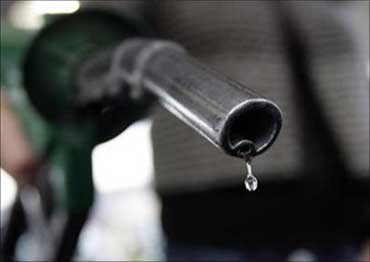
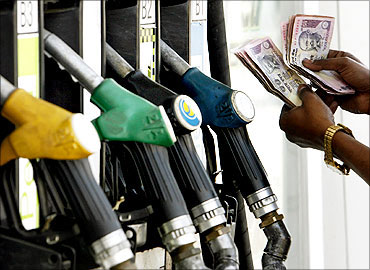
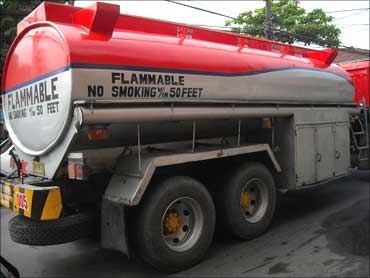
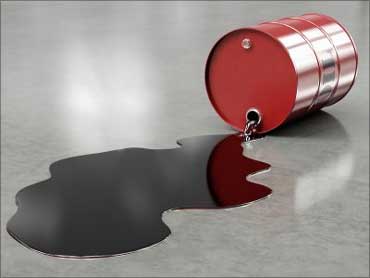
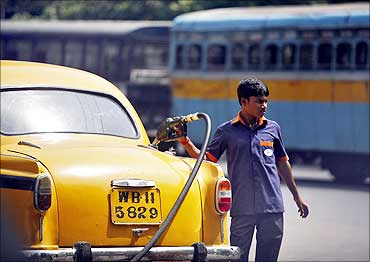
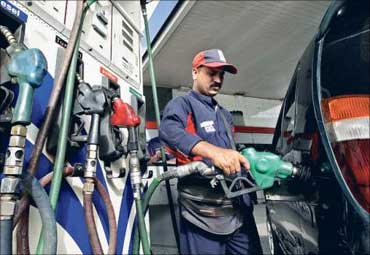
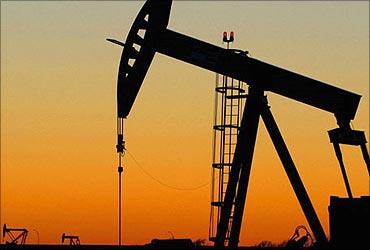
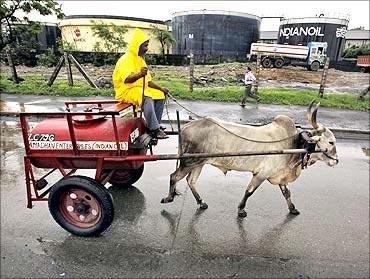
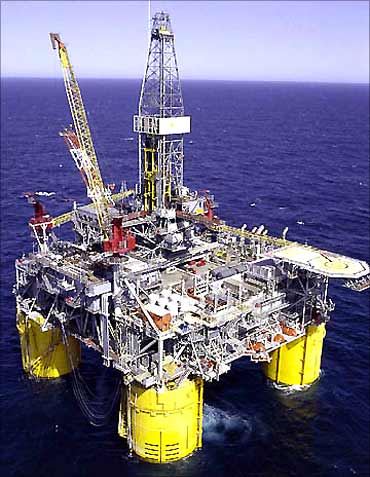
article